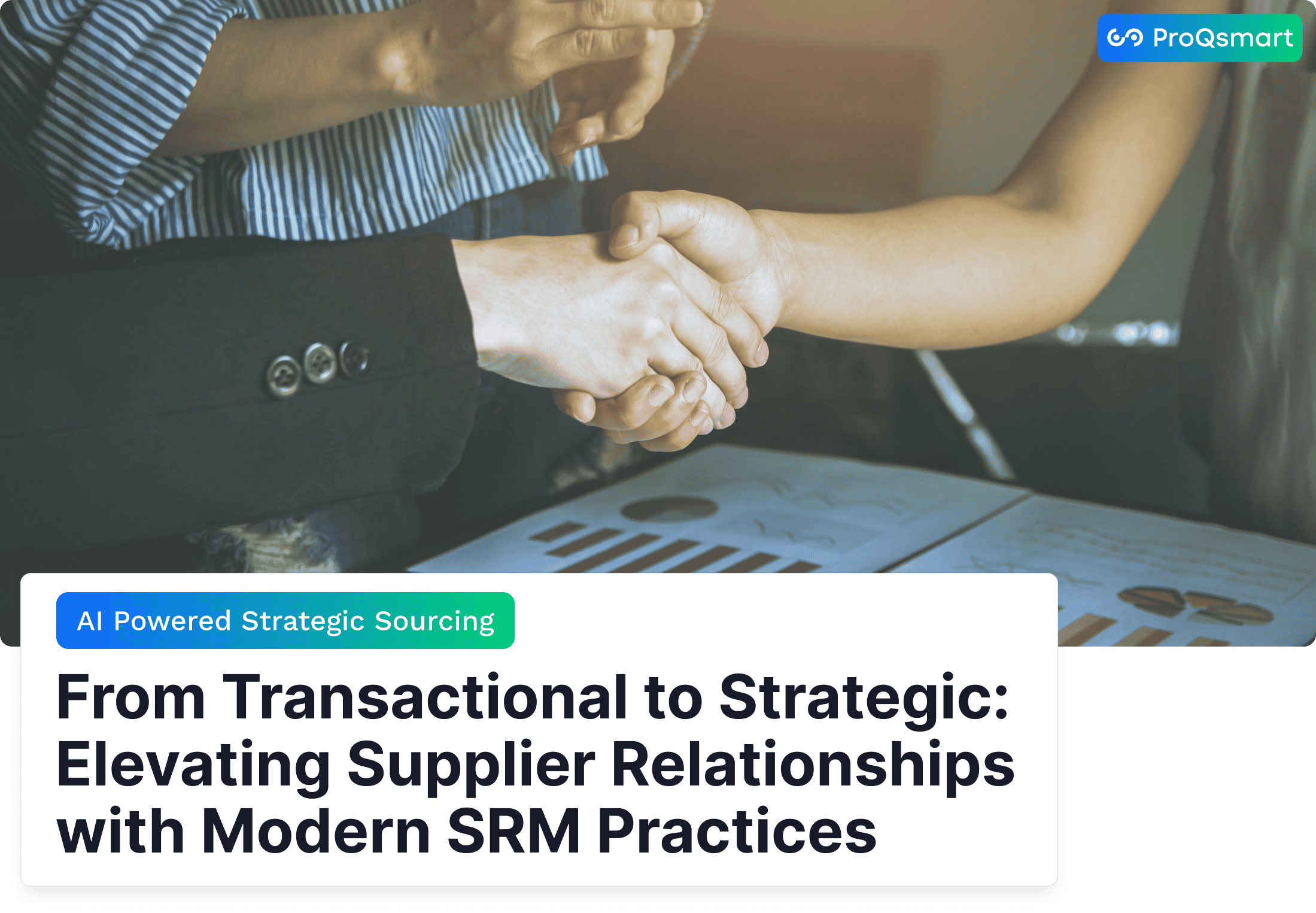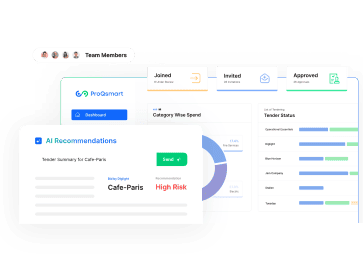Supplier relationship management (SRM) focuses on building and maintaining effective partnerships with suppliers to enhance procurement operations and drive value across the supply chain. It involves strategies for selecting the right suppliers, fostering collaboration, and ensuring consistent performance to meet business goals.
By prioritizing trust and open communication, organizations can reduce risks, improve efficiency, and achieve cost savings. In today’s competitive market, strong supplier relationships support innovation and sustainability, allowing businesses to adapt to changing demands and regulations.
Whether you are managing long-term contracts or evaluating new vendors, understanding the fundamentals of supplier relationship management can streamline your processes and contribute to your organization’s overall success.
What is Supplier Relationship Management?
Supplier Relationship Management (SRM) is a strategic approach designed to manage interactions with vendors effectively while aligning their performance with organizational goals. It goes beyond the transaction-based interactions to prioritize the value of long-term relationships that create both parties’ success.
SRM enables companies to focus on their most important relationships by segmenting and classifying their suppliers. By taking risk and profitability into account, SRM gives organizations the ability to create differentiated strategies for each supplier. Methods and tools such as the ProQsmart are integral to the segmentation process. These metrics help create a clear, logical framework to understand how suppliers contribute to, or hinder, your organization’s objectives.
SRM is a key component in achieving manufacturing objectives through improved supplier engagement and effective procurement and supply chain management. It involves three key stages:
- Meeting immediate needs
- Anticipating future requirements
- Fostering sustainable partnerships
Why Strategic SRM Matters
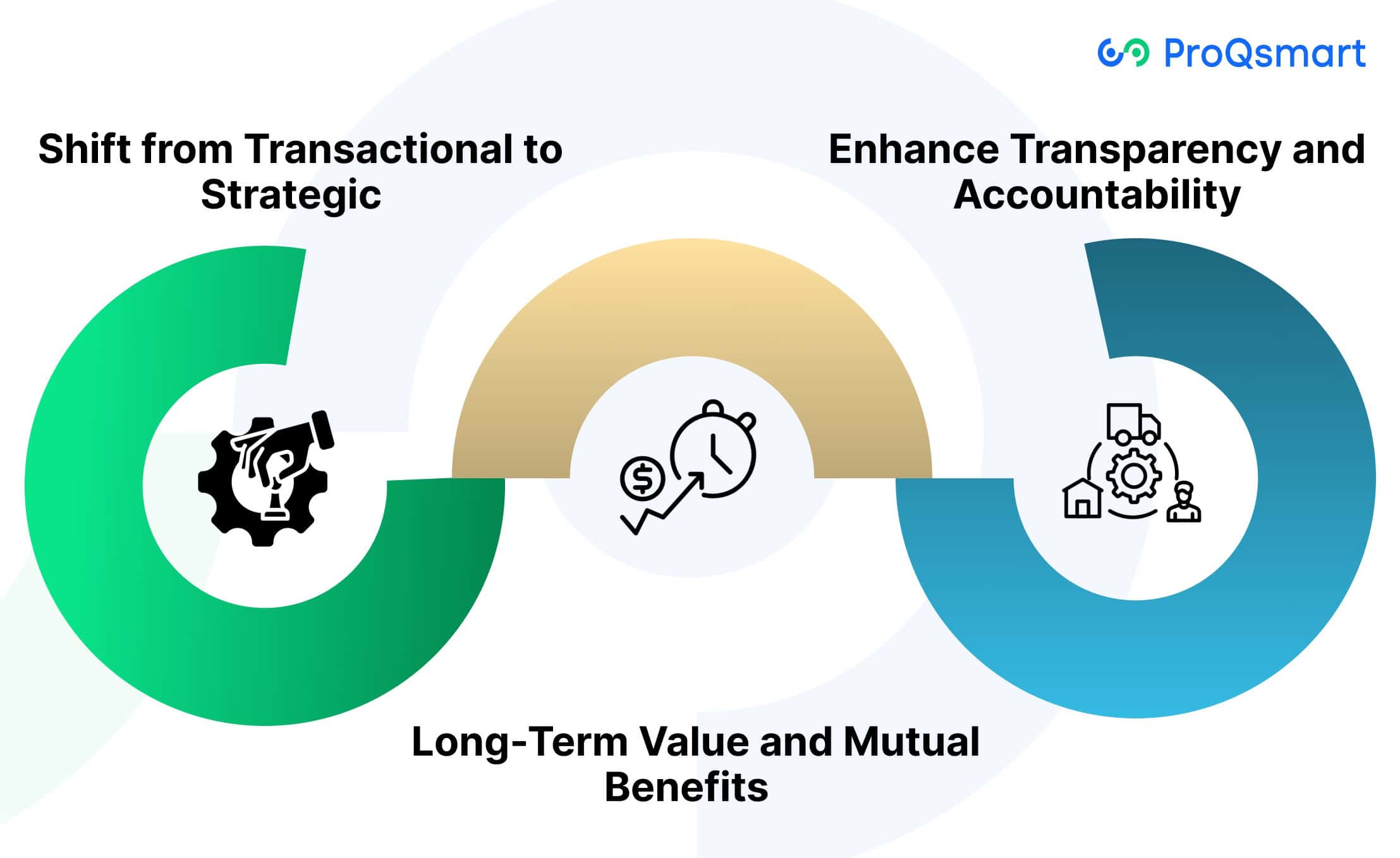
Leading organizations know that Strategic Supplier Relationship Management (SRM) is a vital component of achieving procurement excellence. It takes a focus on developing long-lasting, value-oriented relationships that surpass basic buying and selling. When businesses commit to strategic supplier relationship management, they’re able to improve operational efficiency, keep costs down, and innovate.
By focusing on collaboration, transparency, and alignment—key components of SRM—agencies can optimize their procurement strategies and better navigate today’s dynamic market landscape.
Shift from Transactional to Strategic
By making the shift from transactional procurement to strategic SRM, these suppliers become partners within the ecosystem, driving shared success and value. This approach fosters more strategic collaboration, in which suppliers are empowered to offer creative solutions and insights, pursuing even greater competitive advantages.
Strategic partnerships simplify these processes too, whether it’s through automating menial tasks or utilizing their suppliers’ expertise, all to create value over time.
Long-Term Value and Mutual Benefits
Developing these win-win solutions establishes a deeper level of trust to promote both parties’ growth and success. Transparent communication and consistent performance tracking are key to finding this balance.
Tools like ProQsmart, for example, can automate workflows and actively monitor supplier performance, empowering businesses to better align procurement with their strategic goals. This kind of alignment between organization and supplier helps yield greater profitability while advancing sustainable practices by leveraging suppliers’ capabilities to the fullest extent.
The outcome is a procurement ecosystem in which all stakeholders succeed.
Enhancing Supply Chain Resilience
Building good supplier relationships strengthens supply chain resilience because they allow for faster adaptation to disruptions. Proactive risk management, combined with real-time collaboration tools, such as those enabled by ProQsmart, fortify stability and continuity.
By building these types of strong partnerships, organizations can continue to operate without interruption, regardless of the difficulties they face.
Advantages of Strategic SRM
Strategic SRM is a widely misunderstood concept, often confused with transactional coordination. It focuses on building mutually valuable relationships with suppliers. By taking a proactive, strategic approach to SRM, companies can identify areas where they can innovate, save costs and reduce risk.
By promoting higher levels of collaboration, SRM turns suppliers into strategic partners that help drive an organization’s long-term success.
Foster Innovation and Collaboration
When suppliers are genuinely treated as partners, collaborative environments organically form and motivate ideas to circulate. Innovative joint product development initiatives, for instance, can accelerate new innovations by leveraging your deep technical expertise with suppliers’ specialized knowledge.
This culture of collaboration fosters innovation in solving problems and drives improvement through iteration. Only 15% of suppliers focus on working together in their supplier relationships. This laser focus raises the visibility of something that is critical to achieving shared goals.
Optimize Costs Through Partnerships
Tapping into strategic SRM gives companies the right tools to negotiate better terms and optimize resource allocation. Most importantly, it enables them to save money in immediate and future budgets.
Solid relationships foster consistent pricing models and streamlined procurement timelines. For example, using supplier expertise directly through supplier platforms such as ProQsmart can find areas to save costs without sacrificing compliance.
With ProQsmart’s AI-driven tools, inefficient workflows are transformed into streamlined, more transparent processes, creating clear, measurable financial benefits.
Improve Quality and Reliability
Focusing supplier capabilities on your quality standards will help to ensure the product and service they deliver meets your needs every time. Regular feedback loops, bolstered by tools like ProQsmart’s supplier performance monitoring, ensure consistently high quality while fostering collaboration and trust.
These relationships strengthen reliability, minimizing service disruptions and helping to maintain customer loyalty.
Enhance Risk Management
Perhaps more importantly, effective SRM identifies risks before they threaten production, often before suppliers themselves fully recognize these risks. ProQsmart’s real-time tracking and transparency tools enhance visibility across the supply chain, allowing companies to proactively mitigate risks before they cause disruptions.
Collaborative contingency planning ensures preparedness for unforeseen challenges.
Align Goals for Better Performance
Common goals and agreed-upon measures of success promote a win-win mentality. ProQsmart’s automated workflows make collaborative goal-setting easy.
Procurement solutions that are focused on budgets increase the accountability of suppliers and lead to performance improvements.
Key Strategies for Building Collaborative Partnerships
Expanding upon, and one of the first steps toward, a comprehensive SRM program, building strong, collaborative partnerships with suppliers is a key SRM strategy. It takes an intentional strategy, consistent engagement, and joint value creation to develop successful enterprise partnerships that are built to last.
With these key strategies in place, you’ll be able to improve the performance of your supply base, mitigate risks, and fuel extensive and sustained development.
Conduct Supplier Segmentation
Supplier segmentation Webinars Addressing Procurement Supplier Intelligence Segmenting your supplier base into distinguished groups is critical to managing them effectively. Suppliers typically fall into three categories:
- Critical to core operations and long-term goals.
- Tactical suppliers: Support specific projects or medium-term needs.
- Tail suppliers: Low-value or transactional suppliers.
By prioritizing strategic suppliers, relationship-building efforts are targeted to areas most needed. With tactical and tail suppliers, the process is simplified. For instance, leveraging ProQsmart’s supplier performance monitoring can help consistently evaluate supplier contributions across all categories, ensuring alignment with organizational priorities.
Develop Clear Performance Metrics
Establishing measurable performance metrics strengthens accountability. Metrics such as on-time delivery, quality standards, and cost-effectiveness should align with broader business objectives.
Regular reviews foster continuous improvement, empowering suppliers to meet evolving goals. ProQsmart’s AI-driven tools automate these assessments, ensuring transparency and actionable insights.
Establish Open Communication Channels
Establishing a culture of transparent communication builds trust and authority between all the various collaborators. Frequent check-ins, constructive feedback loops, and clear communication of expectations help build that collaborative sense of ownership.
Real-time collaboration and document management with ProQsmart helps move ideas easily through the development pipeline with consistent communication and documentation so they all work seamlessly together.
Implement Continuous Improvement Programs
By embedding ongoing intelligence development and operations improvement initiatives into supplier relationships, States can create value for both parties. Collaborative undertakings, such as joint development projects, increase agency performance and innovation.
ProQsmart’s tools help establish baselines, monitor advancement, adjust approaches, and push towards compliance to deliver results that are quantifiable and meaningful.
Technology’s Role in Transforming SRM
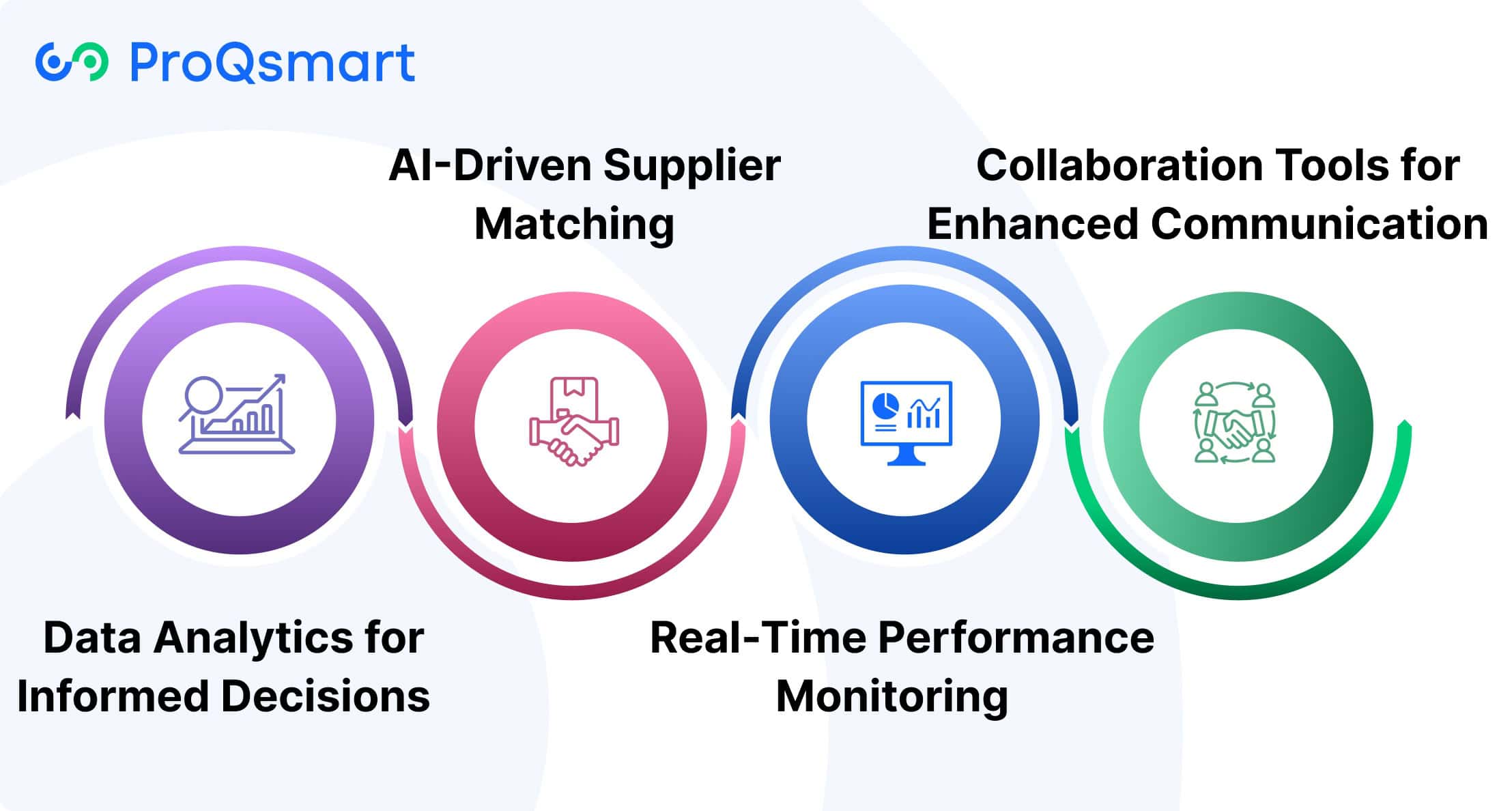
Supplier relationship management (SRM) has seen a radical change, largely driven by new technologies. This evolution has transformed SRM into a critical tool for companies wanting to improve supply chain efficiency and adopt sustainable practices. By leveraging modern supplier relationship management practices, organizations can streamline procurement processes and build stronger, data-driven relationships that drive measurable outcomes.
Data Analytics for Informed Decisions
Data analytics lie at the heart of successful SRM, since it takes mountains of raw data and turns it into targeted, actionable insights. By analyzing supplier performance metrics, organizations can make well-informed decisions that optimize contracts and sourcing strategies.
For example, knowing which suppliers have on-time delivery and defect-free performance gives you confidence in operational reliability. Furthermore, analytics can highlight potential risks, such as over-reliance on a single supplier, enabling businesses to diversify and mitigate disruptions.
Pricing trends and changes in lead times or market conditions can be identified as well so that procurement strategies can be adjusted proactively.
AI-Driven Supplier Matching
Artificial intelligence improves supplier evaluation by breaking down large datasets to find partnerships best suited to an organization’s mission. Through these analytical AI tools that determine capacity, compliance, and through a review of the contractor’s historical performance, SRM is guaranteed an optimal match.
By automating this painfully manual process, procurement teams save on lengthy cycle times and drive focus towards more strategic priorities. Solutions like ProQsmart, for instance, offer AI-driven supplier matching, consolidating e-tendering and promoting competition that drive savings.
Real-Time Performance Monitoring
Real-time monitoring tools offer on-the-spot feedback, giving businesses the ability to monitor key performance indicators and proactively tackle potential issues. Metrics such as on-time delivery and quality fulfilment can be measured in real time.
Implemented with platforms like ProQsmart, supplier performance reviews are streamlined, minimizing risk of non-compliance with contract terms and promoting positive transparency.
Collaboration Tools for Enhanced Communication
Effective SRM requires effective collaboration tools, like instant messaging channels, project management software, and shared document platforms. In the end, these tools make it easier to coordinate to enhance overall engagement between teams and across the supplier networks.
ProQsmart’s innovative suite of real-time collaboration features takes this communication to the next level, unifying procurement and your organization’s broader goals.
Best Practices for Implementing Strategic SRM
Strategic SRM is a key discipline to unlocking more value, moving the function beyond tactical procurement. By developing stakeholder collaboration, mutual trust, and aligned objectives, SRM allows organizations to create durability in supply chains while pursuing greater resilience and long-term prosperity.
To implement it successfully, there should be orderly but flexible approaches from organizations.
Define Clear Objectives and Goals
Establishing clear objectives is fundamental to SRM success. Goals such as improving supplier quality, reducing lead times, or enhancing sustainability must align with overall business priorities.
For example, if your company aims to lower production costs by 10%, supplier objectives should include cost-efficient sourcing strategies. This alignment ensures that both parties work toward shared outcomes, which is crucial for measuring performance and fostering accountability.
ProQsmart, with its supplier performance monitoring feature, simplifies this process by providing real-time assessment tools.
Establish Governance and Processes
Clear governance structures and deliberate processes become crucial for maintaining those supplier relationships strategically. Staff standardized policies to ensure engagement policy consistency and standardized practices like regular performance review foster trust.
As an example, SRM systems such as ProQsmart automate workflows from compliance audits to contract management for streamlined collaboration.
Invest in Training and Development
Giving procurement teams more sophisticated tools and skills makes them more effective at navigating today’s complicated and sometimes controversial supplier ecosystems. Ongoing training, made easier with thorough onboarding from platforms such as ProQsmart, deepens the comprehension of SRM technologies and best practices.
This proactive investment goes a long way toward reinforcing profitable relationships with existing suppliers while fostering innovation.
Monitor and Evaluate Performance Regularly
Moving forward, tracking KPIs like delivery times, any quality metrics, and overall cost-savings is essential. Conducting regular evaluations helps to identify gaps, allowing for proactive changes to strategies.
Continue using ProQsmart’s analytics to leverage insights that provide direction for continued improvements over time.
Future Trends in Supplier Relationship Management
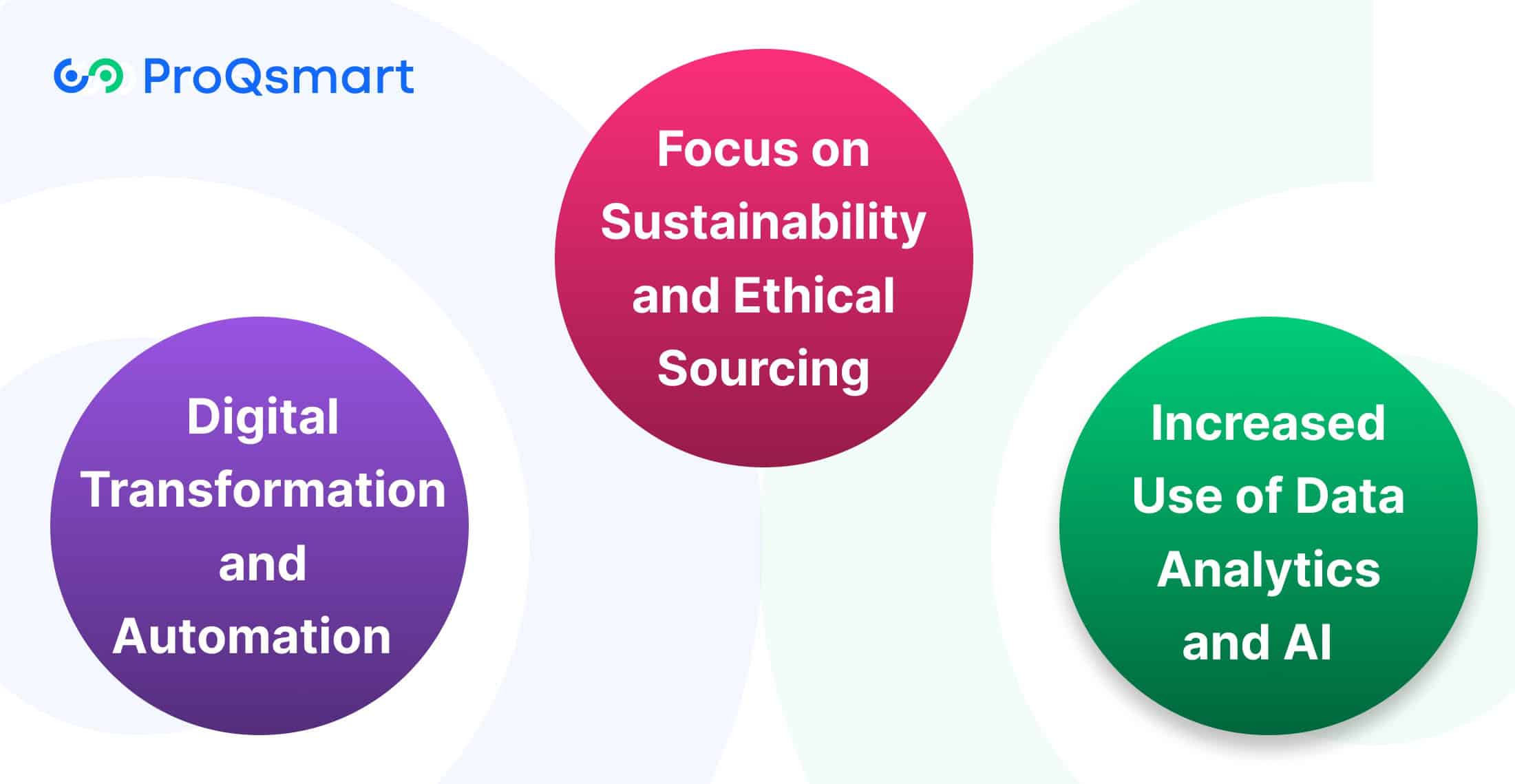
Supplier relationship management (SRM) is changing at a dizzying pace. Driving this transformation is the rapid advancement of technology, sustainability efforts, and the increasing importance for data-driven decision making. In order to stay ahead of the curve, companies need to respond to these new trends and incorporate innovative approaches into their SRM programs.
Here are some of the most important areas influencing the future of SRM that we highlight below.
Digital Transformation and Automation
Digital tools and automation are changing the way organizations conduct SRM, enabling more streamlined processes and improved efficiency. Platforms like ProQsmart make supplier relationship management efficient by providing tools to establish automated workflows, enable real-time collaboration, and track supplier performance.
Leveraging AI-driven solutions can enhance vendor performance and productivity. According to Gartner, by 2026, 60% of procurement teams will leverage these advanced tools. Cloud-based software — now the predominant player in the procurement market at 40% market share — increases accessibility and scalability for these organizations even more.
Businesses adopting these technologies experience improved transparency, cost savings, and alignment with compliance standards, making digital transformation essential for modern SRM.
Focus on Sustainability and Ethical Sourcing
Sustainability and ethical sourcing have grown increasingly important in enhancing supplier relationships. Companies are under mounting pressure, from consumers and investors alike, to prioritize suppliers that adhere to standards of environmental and social responsibility.
Ethical sourcing improves brand reputation and can help protect the brand by building trust and goodwill with stakeholders. ProQsmart supports this shift by providing tools to manage compliance and track supplier contributions to sustainability initiatives, ensuring long-term value and alignment with organizational objectives.
Increased Use of Data Analytics and AI
As you can see, data analytics and artificial intelligence take SRM decision-making to a new level. Procurement teams can stay one step ahead of challenges by using the available data, found the Gartner survey.
This latter approach promotes innovation through formalized processes, evidenced by the seven-phase supplier innovation model. Technological tools, like ProQsmart, are improving supplier matching and performance evaluation, allowing businesses to remain competitive in a fast-paced and dynamic marketplace.
Conclusion
In conclusion, strong supplier relationships are crucial for business success, as they lead to superior agreements, robust alliances, and more efficient practices. Strategic Supplier Relationship Management (SRM) is not just a process; it’s a strategic approach to generating value and fostering trust with suppliers. By leveraging intentional strategies, collaboration, and advanced technology, businesses can transform suppliers into lifelong allies.
ProQsmart is a leading solution that empowers businesses to elevate their supplier relationships with AI-driven insights, real-time performance monitoring, and collaborative tools. With ProQsmart, organizations can streamline supplier management, enhance collaboration, and drive long-term success.
Take the next step in transforming your supplier relationships by exploring how ProQsmart can help you build stronger, more strategic partnerships. Book a demo with ProQsmart today to discover firsthand how its innovative platform can enhance your SRM processes and drive business growth.
FAQs
What is Supplier Relationship Management (SRM)?
Why is Strategic SRM important for businesses?
What are the key benefits of adopting Strategic SRM?
How can technology improve Supplier Relationship Management?
What role do collaborative partnerships play in SRM?
Collaborative partnerships in supplier relationship management (SRM) foster trust and transparency, which are crucial for managing supplier relationships. Most importantly, they create an environment where suppliers want to share new ideas, leading to better quality and growth for both parties.

